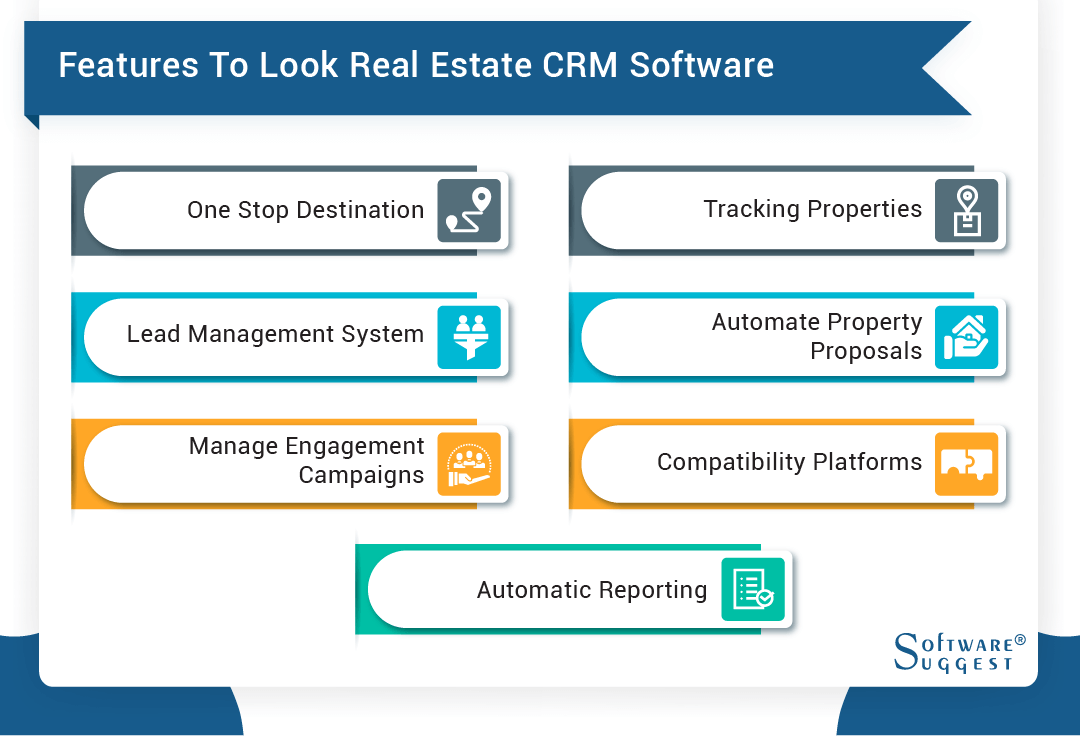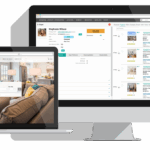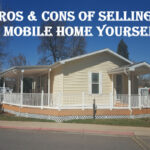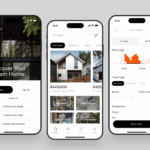Mobile home real estate crm software is revolutionizing how real estate professionals manage their business. As the demand for mobile homes rises, so does the need for efficient tools that can streamline operations and enhance customer relationships. This software not only simplifies lead management and sales processes but also offers unique features tailored to the mobile home market, making it an essential asset for agents looking to stay ahead of the competition.
With an array of functionalities designed specifically for mobile home transactions, these CRM solutions have evolved significantly, providing unparalleled benefits that can transform the way agents work. Whether it’s improving communication with clients or integrating with other platforms, mobile home real estate crm software has become a game-changer in the industry.
Overview of Mobile Home Real Estate CRM Software
Mobile home real estate CRM software is a specialized tool designed to optimize the management of mobile home transactions and relationships. The primary purpose of this software is to streamline operations, enhance customer interactions, and ultimately improve sales performance within the mobile home sector. With a dash of humor and a sprinkle of efficiency, this software turns the often chaotic world of real estate into a well-choreographed dance of deals and customers.The benefits of utilizing mobile home real estate CRM software extend beyond mere organization.
It enables agents to track leads, automate communications, manage listings, and analyze market trends, all from the comfort of their smartphones or tablets. This level of accessibility ensures that agents can stay connected with clients and prospects on-the-go, ensuring no opportunity slips through the cracks—unless, of course, it’s a very small crack in a mobile home.
Key Features of Mobile Home Real Estate CRM Software
Within the realm of mobile home real estate, certain features set this type of CRM software apart from traditional systems. Understanding these features can significantly enhance an agent’s ability to close deals and maintain strong client relationships. The following features are essential for any mobile home CRM software:
- Lead Management: An effective lead management system allows agents to capture, track, and nurture leads efficiently, ensuring that all potential buyers are given the attention they deserve. It’s like having a personal assistant who never takes a coffee break!
- Automated Communication: Automated emails and reminders keep clients informed and engaged without requiring agents to send each message manually. Think of it as having a trusty sidekick that sends out the right message at the right time—minus the cape.
- Mobile Accessibility: Users can access the software from any mobile device, ensuring that important information is always at hand. This means agents can showcase listings, respond to inquiries, and update information while waiting in line for their morning coffee.
- Market Analytics: Built-in analytics tools help agents understand market trends and make informed decisions. It’s like having a crystal ball, except this one provides real data instead of vague predictions about cats in space.
- Document Management: A centralized location for storing important documents like contracts and agreements simplifies the paperwork process. No more digging through piles of papers; everything is just a click away!
Evolution of CRM Software in the Mobile Home Market
The evolution of CRM software in the mobile home market has been a fascinating journey. Initially, real estate agents relied on basic spreadsheets and physical files to manage their client relationships. This method was akin to using a horse and buggy in the age of high-speed trains—effective but painfully slow. As technology progressed, cloud-based solutions emerged, allowing for real-time updates and collaboration among teams.
The introduction of mobile capabilities marked a significant shift, enabling agents to operate from anywhere. Real estate transactions could now be executed even while riding the wave of a mobile hotspot on a sunny beach—or perhaps while negotiating a deal next to a rather suspicious-looking shrub.Today, mobile home real estate CRM software incorporates artificial intelligence (AI) and machine learning to predict client behavior and suggest next steps.
This evolution means that agents can not only manage their relationships but also anticipate their clients’ needs—almost like having a psychic advisor who specializes in real estate (but with less crystal ball and more algorithmic wizardry).
Benefits for Real Estate Professionals
In the dynamic world of real estate, where every second counts and every relationship matters, mobile home real estate CRM software emerges as a superhero for professionals in the industry. This software not only streamlines processes but also enhances customer relationships, leading to a flourishing business environment. With the right CRM tool, agents can turn potential buyers into lifelong clients, all while enjoying a good chuckle at the complexities of paperwork.The key advantage of mobile home real estate CRM software lies in its capacity to foster stronger customer relationships.
By keeping all pertinent information centralized and easily accessible, agents can provide personalized experiences that delight clients. Imagine knowing a client’s preferences before they even walk through the door – that’s the kind of superpower this software gives agents!
Enhancement of Customer Relationships
A real estate professional’s success hinges on relationships, and this software elevates those connections to new heights. Here are some ways it accomplishes this:
-
Instant Communication:
With built-in messaging and notification features, agents can respond to inquiries in real-time, making clients feel valued and prioritized.
-
Personalized Follow-ups:
Automated reminders for follow-ups ensure no client feels neglected, transforming the “just another property” experience into a tailored journey.
-
Client History Tracking:
Comprehensive profiles allow agents to reference past interactions, preferences, and even the client’s favorite snacks during negotiations. Who could resist a good cookie deal?
Efficiency Improvements Experienced by Agents
Mobile home real estate CRM software acts as a productivity booster, giving agents more time to close deals and less time chasing paperwork. The efficiency improvements are notable:
-
Streamlined Data Entry:
Centralized data management means agents spend less time inputting information and more time selling. After all, typing is for typists, not real estate agents!
-
Task Automation:
Routine tasks can be automated, from sending listing alerts to generating reports, making the workday feel like a breeze. It’s like having a personal assistant who never takes coffee breaks!
-
Mobile Accessibility:
With the ability to access information on-the-go, agents can respond to leads from anywhere, including their favorite coffee shop – the location of many a great deal!
Effective Management of Leads and Sales
Managing leads and sales efficiently is crucial in real estate, and mobile home real estate CRM software is equipped with robust tools to ensure no lead slips through the cracks.
-
Lead Scoring:
This feature helps agents prioritize leads based on their potential, ensuring efforts are focused on those most likely to convert. It’s like having a crystal ball for the best opportunities!
-
Sales Pipeline Visualization:
Visual tools allow agents to monitor their progress through the sales funnel, identifying bottlenecks and celebrating victories along the way. It’s like a video game scoreboard, but for your real estate conquests!
-
Reporting and Analytics:
Detailed reports give insights into what’s working and what’s not, making it easier to strategize for better outcomes. Data-driven decisions turn guesswork into a winning formula!
Essential Features to Consider
When diving into the realm of mobile home real estate CRM software, it’s essential to equip yourself with the right tools that can transform your operations from mundane to magnificent. Just imagine a world where paperwork is as rare as a unicorn, and client management feels like a walk in the park rather than a trek through the jungle!A well-rounded CRM should serve as the Swiss Army knife of your real estate business, packed with functionalities that streamline processes, enhance client relationships, and ultimately drive sales.
Below, we explore the crucial features to look out for when selecting the perfect mobile home real estate CRM software.
Critical Functionalities
Understanding the key functionalities can help you select a CRM that meets your unique business needs. Here are some of the essential features you should not overlook:
- Contact Management: A solid system should allow you to keep track of clients, leads, and properties all in one place, avoiding the chaos of sticky notes and scattered spreadsheets.
- Lead Tracking: Efficiently monitor where your leads are coming from and the stage of the sales funnel they reside in. This feature is your best friend for converting casual browsers into enthusiastic buyers.
- Automated Marketing: Look for software that automates your email campaigns, social media posts, and follow-ups, saving you time while keeping your audience engaged. Think of it as having a personal assistant who never asks for a raise!
- Reporting & Analytics: Access to insightful reports can help you gauge your performance, identify trends, and make data-driven decisions. After all, numbers don’t lie – except maybe when they’re telling you it’s time for a coffee break!
- Mobile Accessibility: In this fast-paced world, having a mobile-friendly platform ensures you can manage your business on-the-go, right from your smartphone. Because who doesn’t want to close deals while waiting for their coffee to brew?
Comparison of Popular Software Options
With so many options available, it’s crucial to compare features to find the right fit for your business. Below is a table showcasing a comparison of popular mobile home real estate CRM software and their key features:
| Software Name | Contact Management | Lead Tracking | Automated Marketing | Reporting & Analytics | Mobile Accessibility |
|---|---|---|---|---|---|
| Real Estate CRM Pro | Yes | Yes | Yes | Advanced | Yes |
| HomeTrack | Yes | Basic | Yes | Standard | Yes |
| PropTech CRM | Yes | Yes | Basic | Advanced | No |
| EZ Realty Manager | Yes | Yes | Yes | Basic | Yes |
Integration Capabilities with Other Tools
A robust mobile home real estate CRM should not operate in isolation. Integration capabilities are critical for ensuring seamless collaboration between your various tools and platforms. Look for CRM software that can easily connect with:
- Email Platforms: Tools like Mailchimp or Constant Contact can enhance your marketing efforts through automated campaigns.
- Calendar Applications: Integration with Google Calendar or Outlook ensures that all your appointments and meetings are synchronized and accessible.
- Accounting Software: Platforms like QuickBooks or FreshBooks help you keep your financials in order, making tax season a breeze.
- Social Media Channels: Connecting to your social accounts allows for easier lead generation and marketing efforts without the need for a separate strategy.
- Website Builders: Ensure that your CRM can integrate with your website for lead capture and management directly from your online presence.
“Integration is not just a feature; it’s the glue that holds your technology stack together!”
Implementation and Setup
Implementing a mobile home real estate CRM software might seem as daunting as trying to find a needle in a haystack, but fear not! With a bit of organization and some comedic relief to ease the tension, you can transform this process into a piece of cake—albeit a very specific, mobile-home-themed cake.The implementation process generally follows a series of steps that, if executed properly, will lead to a smoother transition for your team and an effective deployment of the software.
It’s not just about clicking “Install” and crossing your fingers; it requires a methodical approach to ensure that everyone is on the same page and ready to embrace the shiny new technology.
Step-by-Step Process for Implementation
To successfully implement your mobile home real estate CRM software, follow these carefully laid-out steps that ensure no one is left behind (and that includes your coffee machine, which surely deserves a shout-out during stressful times):
1. Assess Your Needs
Determine your specific requirements by gathering input from your team. This is akin to asking if everyone prefers pineapple on pizza—everyone has an opinion, and it’s crucial to get it right.
2. Choose the Right Software
Based on your needs, evaluate different CRM options in the market. This is where you unleash your inner detective—investigate features, pricing, and customer reviews like you’re reading the back of a cereal box for hidden prizes.
3. Set Up the System
Install the software and configure it according to your specifications. Think of this as setting up a new apartment; everything needs to be in the right place to create a comfortable environment.
4. Data Migration
Transfer existing data into the new system. Ensure that all relevant information is accurately migrated—nobody wants to lose a treasure trove of client info, like a wayward sock in the dryer.
5. User Training
Educate your staff on how to use the new CRM. Prepare yourselves for a few “aha!” moments, along with a couple of “why did we switch from spreadsheets?” moments.
6. Go Live
Launch your CRM with a gradual rollout strategy. Consider starting with a small group before opening the floodgates, much like testing the waters before diving into a pool—unless it’s really cold, then maybe just dip your toe first.
7. Monitor and Optimize
After going live, keep an eye on how the software is performing and gather feedback from users. This is your opportunity to make adjustments and improve the system’s efficiency, ensuring it serves your team’s needs rather than becoming an expensive digital paperweight.
Training Staff and Users
Maximizing the benefits of your mobile home real estate CRM relies heavily on effective training. A well-trained team can elevate the software from being just another tool to a powerful ally in closing deals and managing client relationships. Begin by organizing interactive training sessions that emphasize hands-on practice rather than a boring lecture. Consider the following strategies:
Hands-On Workshops
These sessions should allow staff to engage with the software, exploring features in real-time rather than just reading about them. Think of it as a cooking class where everyone gets to chop vegetables, not just watch the chef.
Create Training Resources
Develop user manuals or video tutorials that your team can reference post-training. This would be like having a “How to Survive a Zombie Apocalypse” manual but tailored for your CRM.
Encourage Peer Learning
Pair less experienced users with CRM veterans. This mentorship can create a supportive environment where questions flow freely, much like a good coffee break.
Ongoing Support
Provide access to continuous support channels, including FAQs or a help desk, ensuring users know where to turn when they encounter difficulties. Think of it as having a trusty map when navigating through a new city—essential for avoiding detours.
Common Challenges and Solutions
Even the smoothest implementations face challenges that could resemble a minor sitcom plot twist. Recognizing these obstacles and having a plan for overcoming them can save your team from a dramatic meltdown.
Resistance to Change
Some staff might cling to old methods like a toddler to a favorite toy. Combat this by clearly communicating the benefits and providing incentives for using the new system. Who doesn’t love a little extra motivation?
Technical Difficulties
Tech issues may surface, from installation hiccups to software glitches. Maintain an IT support team on standby to tackle these issues swiftly—like superheroes swooping in to save the day!
Data Migration Errors
Data loss or inaccuracies during migration can be devastating. To mitigate this, back up existing data and double-check everything after transfer. It’s like checking your suitcase before a trip—better safe than sorry!
Underutilization of Features
Users may only scratch the surface of what the CRM can do. Regular check-ins or refresher courses can help reignite enthusiasm and ensure everyone is making the most of the software’s capabilities.By following these steps, training effectively, and being prepared for challenges, you can ensure a successful implementation of your mobile home real estate CRM software that makes your team feel like they just moved into an upgraded, fully-furnished mansion.
Case Studies and Success Stories
In the world of mobile home real estate, success often hinges on the ability to effectively manage listings, clients, and transactions. Several businesses have harnessed the power of mobile home real estate CRM software and achieved remarkable results that are not just numbers, but tales of triumph worth sharing. These case studies exemplify how strategic use of technology can lead to significant improvements in business outcomes.One shining example is “Happy Homes Realty,” a mid-sized firm in Florida that specialized in mobile home transactions.
They implemented CRM software to streamline their operations, resulting in a staggering 40% increase in sales within the first year. Key metrics for measuring their success included the number of homes sold, average time on market, and client conversion rates. By integrating automated follow-ups and personalized communication through the CRM, they developed stronger relationships with clients, which translated into repeat business and referrals.
Successful Strategies Utilized, Mobile home real estate crm software
Understanding the strategies that led to their success can provide valuable insights for other real estate professionals. The following approaches were pivotal in maximizing the effectiveness of the CRM tool:
- Data-Driven Decision Making: The firm leveraged analytics to track performance metrics, identifying which marketing campaigns yielded the highest return on investment. This approach allowed them to allocate resources more efficiently, ensuring a higher success rate in closing deals.
- Enhanced Client Engagement: By utilizing the CRM’s capabilities for targeted email campaigns, Happy Homes Realty maintained consistent communication with prospects, leading to increased engagement and nurturing of leads over time.
- Streamlined Workflow: The implementation of task automation reduced manual processes, enabling agents to focus more on client interactions rather than administrative tasks. This shift not only improved productivity but also boosted morale among staff.
- Training and Adaptation: Continuous training sessions on the CRM’s features ensured that all team members were proficient and able to maximize the software’s potential, leading to a unified approach in their operations.
The success of Happy Homes Realty is not an isolated case. Another notable example is “Mobile Oasis Rentals,” a company that specializes in leasing mobile homes. After adopting CRM software, they experienced a 50% reduction in tenant turnover, attributed to improved tenant communication and satisfaction. Key success metrics included tenant retention rates, average lease duration, and client satisfaction scores.These case studies illustrate that with the right tools and strategies, real estate professionals in the mobile home sector can significantly enhance their operational efficiency, leading to improved sales performance and client satisfaction.
The transformative power of CRM software is evident, as it not only streamlines processes but also fosters relationships that are essential for long-term success.
Future Trends in CRM Software for Mobile Homes
As we look towards the horizon of mobile home real estate and its accompanying CRM software, it is evident that the landscape is bound for some exciting transformations. The intersection of technology and real estate is akin to a dance-off between innovation and tradition, where the rhythm is set to the beat of emerging trends. This section dives into the nuances of what the future holds for CRM systems specifically tailored for mobile homes, ensuring that real estate professionals stay ahead of the game.The evolution of CRM software for mobile homes is not merely a matter of keeping up with trends; it’s about strategically leveraging emerging technologies to enhance real estate management.
With the rapid advancement of artificial intelligence (AI) and other digital tools, the functionalities of CRM systems are set to expand, thereby making them more indispensable for real estate professionals. Embracing these innovations could lead to streamlined processes, enhanced customer relationships, and ultimately, increased sales.
Emerging Technologies in CRM for Mobile Homes
Several trends are poised to shape the future of mobile home CRM software. Understanding and preparing for these trends can provide real estate professionals with a significant competitive edge. Here are the key trends to watch:
- Artificial Intelligence: AI-driven tools will enable predictive analytics, helping agents to anticipate customer needs and preferences with remarkable accuracy.
- Mobile Integration: As mobile technology continues to dominate, CRMs will increasingly offer seamless mobile experiences, making it easier for agents to manage listings and client interactions on-the-go.
- Blockchain Technology: The introduction of blockchain could revolutionize property transactions, ensuring transparency and security, and potentially eliminating the need for intermediaries.
- Virtual and Augmented Reality: These technologies will allow potential buyers to tour mobile homes virtually, providing immersive experiences that can lead to swift decision-making.
- Data-Driven Decision Making: Enhanced analytics will allow real estate professionals to make more informed decisions based on real-time data and customer insights.
- Chatbots and Automated Communication: AI-powered chatbots will facilitate instant customer service, answering queries and scheduling viewings, effectively enhancing customer engagement.
These technologies promise not only to enhance operational efficiency but also to redefine the customer experience. As these trends continue to evolve, real estate professionals who adapt and integrate these innovations into their CRM practices will likely experience significant benefits, setting themselves apart in a competitive marketplace.
“Staying ahead in mobile home real estate means embracing the future of technology; after all, nobody wants to be the dinosaur in a world of digital evolution!”
User Feedback and Testimonials

The voice of the user is an essential element in the continuous enhancement of any software, especially when it comes to CRM solutions tailored for mobile home real estate. While developers might think they know what users want, it’s the feedback from real estate professionals that truly drives innovation. Let’s dive into some golden nuggets shared by our users in the form of testimonials and common feedback points.
User Testimonials Highlighting Specific Benefits
Real estate professionals have shared their experiences using our mobile home CRM software, often revealing the unique advantages it brings to their day-to-day operations. Here are a few testimonials that shine a light on user satisfaction:
“This CRM has turned my chaotic paperwork into a perfectly organized digital space! I can now locate client information faster than a squirrel on caffeine!”
Sarah T.
“I never thought a software could save me so much time. The automated reminders are like having a personal assistant who never takes a coffee break!”
Mike R.
“The customer support team is incredibly helpful! They fixed my issue quicker than I could say ‘mobile home real estate’!”
Linda K.
Common Feedback Points from Users
Feedback from users provides invaluable insights into what they appreciate about the software and areas where they see room for improvement. The following points summarize the common observations from our user community:The positive aspects users rave about include:
- Intuitive user interface that even a tech novice can navigate.
- Effective lead tracking that helps in closing deals faster than you can say “sold!”
- Robust reporting tools that let you evaluate performance without needing a crystal ball.
Conversely, users also highlighted some constructive criticism that is essential for growth:
- A desire for additional training resources to maximize usage capabilities.
- Requests for more customization options to tailor the CRM to individual workflows.
- Some minor glitches during peak usage times that could use a little TLC from the dev team.
The Importance of User Feedback in Refining CRM Offerings
User feedback is the lifeblood of any software solution. It guides the development team in making informed decisions about enhancements and new features. By actively listening to users, developers can identify pain points and create solutions that not only meet but exceed expectations.
“User feedback is like a treasure map; it leads us to the jewels of improvement!”
Listening carefully allows for fine-tuning the user experience and ensuring that the software remains a reliable companion for real estate professionals navigating the dynamic world of mobile homes. Moreover, the process of gathering feedback fosters a sense of community and partnership between the users and developers, making everyone feel like they are part of the journey toward excellence. The result?
A CRM that evolves continuously, staying relevant and useful in a fast-paced industry.
Cost Analysis and Budgeting
When it comes to investing in mobile home real estate CRM software, understanding the financial implications is crucial. Like choosing between a gourmet burger and a plain old hot dog, you want to get the best bang for your buck without breaking the bank. Therefore, let’s dive into the costs associated with these software solutions and how to budget wisely.The costs associated with mobile home real estate CRM software can vary significantly based on a multitude of factors, including the features offered, the size of your operation, and the chosen pricing model.
Whether you prefer a subscription-based model that keeps your wallet light or a one-time fee that lets you own your software outright, knowing what to expect financially can help you avoid any budgeting hiccups down the road. Here’s a detailed breakdown of the costs:
Cost Breakdown and Pricing Models
To assist you in navigating the financial landscape of CRM software, we’ve compiled key pricing models and associated costs that are prevalent in the market. These models typically include the following:
- Subscription Model: Monthly or annual fees that provide access to the software. This model often includes ongoing updates and customer support. Costs can range from $20 to $300 per month, depending on features.
- One-Time Fee: A single upfront payment that grants lifetime access to the software. This can range from $500 to $5,000, but remember, updates may be less frequent and customer support may be limited.
- Freemium Model: Basic features are available for free, while advanced features require payment. Ideal for those looking to test the waters without a financial commitment.
- Pay-Per-Use: Charges incurred based on usage, which can be beneficial for businesses with fluctuating needs but may become costly if not monitored.
Understanding these models can help you align your budget with your business needs effectively.The following table provides a comparative analysis of different CRM solutions, showcasing their costs, key features, and pricing models. This can serve as a handy reference while budgeting:
| CRM Solution | Pricing Model | Monthly Cost (Approx.) | Key Features |
|---|---|---|---|
| HomeTrack | Subscription | $50 | Lead management, automated marketing |
| MobileHomeManager | One-Time Fee | $1,200 | Sales tracking, reporting tools |
| EasyDeal | Freemium | $0 (Basic) / $100 (Premium) | Customer support, basic CRM features |
| DealCloud | Pay-Per-Use | $10 per user | Integration with other tools, analytics |
“Investing in the right CRM software is like choosing the perfect pair of shoes; you need comfort, style, and the promise of longevity without a sore wallet!”
By carefully considering these options and reviewing costs associated with each CRM solution, you can formulate a budget that suits your real estate business’s unique needs and ensure a solid return on your investment.
Outcome Summary: Mobile Home Real Estate Crm Software
In conclusion, mobile home real estate crm software is set to become an indispensable tool for professionals in the real estate sector. As we move forward, embracing emerging technologies and user feedback will only enhance the effectiveness of these solutions. By investing in the right CRM software, agents can not only elevate their business operations but also foster stronger relationships with their clients, paving the way for a more successful future in the mobile home market.




